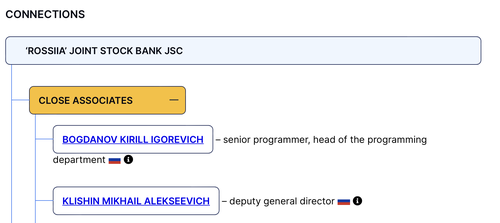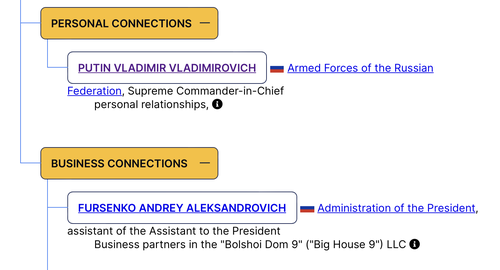RUPEP.org
About the RuPEP.org register
- Politically Exposed Persons (PEPs) — definition
- Types of individuals included in the RuPEP.org database
- Legal entities included in the RuPEP.org database
- Basic and extended profiles of individuals and legal entities
- Sources of information for the RuPEP.org database
- Relevance of information in the RuPEP.org database
- Users of the RuPEP.org database
- Differences of RuPEP.org from other similar databases
- Terms of Use of the RuPEP.org database
Politically Exposed Persons (PEPs) — definition
In its guidelines, FATF identifies 4 risk groups among PEPs:
- High Risk:
- heads of state and government;
- members of government (national and regional);
- members of parliaments (national and regional);
- heads of military, judiciary and law enforcement agencies and board members of central banks;
- senior officials of political parties
- Medium-high risk:
- senior military, judicial and law enforcement officials;
- senior officials of other government agencies and high-ranking civil servants;
- senior leaders of religious groups;
- ambassadors, consuls, high commissioners
- Medium risk:
- senior executives and board members of state-owned enterprises and organisations
- Low risk:
- Mayors and deputies of local, city and district assemblies;
- Senior officials and functionaries of international or supranational organisations.
Types of individuals included in the RuPEP.org database
In addition to the PEPs of Russia and Belarus in the FATF definition, the RuPEP.org database contains information on the following individuals:
- Spouses, close relatives (relatives in the direct ascending and descending line (parents and children, grandparents and grandchildren), full and half (having a common father or mother) brothers and sisters, adoptive parents and adopted children).
- Other relatives of PEPs may also be included in the database if their activities are related to those of PEPs or their close relatives.
- Business partners of PEPs and their relatives. Business partners generally include individuals who have joint interests in companies with PEPs or their relatives.
- Other persons associated with PEPs according to media reports. These include, for example, fiduciaries who hold property or interests in companies for the benefit of PEPs.
- Individuals on EU, US and other sanctions lists, as well as their relatives and business partners.
- Shareholders and managers of companies operating in the Russian military sector, as well as their relatives.
- Heads of military-civilian administrations in the territories of Ukraine occupied by the Russian Federation.
Legal entities included in the RuPEP.org database
The RuPEP.org database contains information on legal entities associated with PEPs and their relatives, as well as persons on the EU, US and other sanctions lists. This includes:
- Legal entities where PEPs or other individuals are/were employed;
- Legal entities where PEPs or other persons are founders, co-owners, shareholders or beneficial owners;
- Legal entities that provide PEPs or others with company or other property management services or nominee services.
Basic and extended profiles of individuals and legal entities
The basic profile of an individual contains the following collected and systematised information:
- first name, last name and patronymic and their transliteration;
- type of profile (PEP, family member, related person, sanctioned person, person with significant political or social influence);
- date of birth;
- tax identification number (if available, or its analogue, personal identification code);
- place of birth;
- place of employment;
- data from public declaration of income and expenditure.
The extended profile of a PEP collects previously publicised and substantiated additional information about the individual's assets and business reputation (if any). This includes:
- geography, history and geographical background of the PEP's business, fortune and assets;
- known family, personal and business ties;
- legal entities related to the PEP;
- application of international sanctions to the PEP;
- existence of criminal cases involving the PEP, his/her procedural status in them;
- criminal record;
- involvement in corruption;
- detailed description of known corruption schemes that the national PEP is associated with.
The profile of a legal entity includes information on its founders, owners, shareholders, as well as counterparties to accessible government contracts.
Sources of information for the RuPEP.org database
The information presented in the database is based on data collected from public sources available to every journalist:
- websites of government agencies;
- Russia's official state registers (Unified State Register of Legal Entities, Unified State Register of Real Estate);
- media reports;
- databases of information leaks (Paradise Papers, Panama Papers, Transborder corruption archive, Aleph OCCRP, etc.);
- public projects Declarator, Open NGOs, Goszatraty, Candidates Encyclopaedia;
- Media and online journalistic investigations;
- Social media profiles of relevant individuals.
Principles of using media and other sources:
- we do not use media reports based on information from unknown sources to fill the database;
- we do not use analytical articles where the source of information is the professional/personal opinion of the author;
- we do not use documents published in media outlets with a reputation for unreliability, such as those that may deliberately publish false information, if their findings cannot be corroborated by information from a more reliable source;
- we do not use audio recordings that have not been verified by a court of law or any other means;
- we use reports of press services of state bodies or information from official websites of state bodies, if such reports do not contain personal judgements of officials and if there are no reasonable grounds to consider the disseminated information untrue;
- we refer to comments of persons who have independently reported certain facts about themselves (e.g. presence of children, marriage, tenure, etc.);
- we refer to photo and video materials, reports from the scene of the event ( videos of court hearings, videos/photos of searches, photos of weddings, etc.);
- we use biographies published on official websites of state bodies, political parties or personal pages, as well as biographies that have been submitted for official purposes (e.g. those submitted for running in elections).
To view the source and date of information, you can click on the corresponding icon in the profile, as shown in this picture:

Relevance of information in the RuPEP.org database
The information in the database is regularly updated, but there may be a delay in reflecting the facts regarding an individual's tenure, ownership of corporate rights, status of a legal entity, status of an individual in criminal proceedings, etc. You can view the source and date of information by clicking on the corresponding icon in the profile, as shown in this picture:

If you think any of the information in a profile is out of date, you can report it by clicking the "Feedback" button in the upper right corner of the screen.
Users of the RuPEP.org database
The RuPEP.org database is primarily designed to prevent and detect the use of funds of dubious and corrupt origin in the international financial system. We identify the following main users of the RuPEP.org database:
- Media and journalists investigating corruption and money laundering;
- Banks, fintech companies and other financial institutions identifying high-risk customers and transactions;
- State financial supervisory and control authorities;
- Public authorities responsible for issuing visas and residency permits;
- State authorities responsible for placing individuals on sanctions lists and overseeing compliance with sanctions;
- Customs authorities;
- Firms providing Due Diligence, investigative, risk assessment and transaction monitoring services;
- Corporate providers, law firms and service companies that are required to verify the origin of client funds;
- Real estate agencies.
Differences of RuPEP.org from other similar databases
The RuPEP.org database is not the only database with this kind of information on PEPs and high-risk individuals. There are several well-known companies that provide access to their similar databases. We believe that the information contained on RuPEP.org is more comprehensive and allows for better risk assessment and identification of questionable transactions.
- RuPEP.org is a public database with open access. Any user can check if a particular individual is in the RuPEP.org database;
- Each profile in the RuPEP.org database is compiled manually based on the analysis of information from various sources;
- The RuPEP.org team consists of journalists and analysts specialising in former USSR countries;
- RuPEP.org team members have extensive experience in anti-corruption investigations and searching for assets of dubious origin in different countries. This experience is taken into account when analysing possible connections and the use of relatives and front men to conceal the origin of funds and assets;
- Social media information is actively analysed and used when compiling profiles and establishing links.
Terms of Use of the RuPEP.org database
By using RuPEP.org you agree to the following Terms & Conditions.
Below you will find basic principles of using RuPEP.org database:
- The search for individuals in the RuPEP.org database is open and available without registration.
- Navigation through profiles and additional information is also open, but only available after registration.
- Registration is free of charge.
- Copying information from the RuPEP.org database manually or with the use of scripts (parsing) is prohibited.
- We welcome the use of the RuPEP.org database by journalists and non-profit organisations for investigations and similar journalistic work and ask that you cite our data.
- We welcome the use of the RuPEP.org database by banks and other financial organisations for risk assessment and KYC checks.
- The information contained in the database may not be copied, transferred to a third party database or used in any commercial product without the consent of RuPEP.org. Commercial use includes, but is not limited to, the following examples:
- Incorporating information from the RuPEP.org database into a database with paid access or subscription.
- Incorporating information from the RuPEP.org database into the internal database of a commercial organisation.
- Selling information from the RuPEP.org database in any form to third parties.
- For organisations wishing to use information from the RuPEP.org database in their own internal databases or commercial products, we offer to conclude a contract for regular retrieval of a full copy of the RuPEP.org database.
- We reserve the right to demand compensation if we detect the use of information from the RuPEP.org database for commercial purposes.